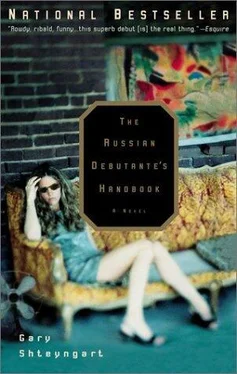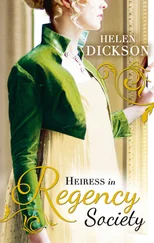Gary Shteyngart - The Russian Debutante's Handbook
Здесь есть возможность читать онлайн «Gary Shteyngart - The Russian Debutante's Handbook» весь текст электронной книги совершенно бесплатно (целиком полную версию без сокращений). В некоторых случаях можно слушать аудио, скачать через торрент в формате fb2 и присутствует краткое содержание. Город: New York, Год выпуска: 2003, ISBN: 2003, Издательство: Riverhead Books, Жанр: Современная проза, Юмористическая проза, на английском языке. Описание произведения, (предисловие) а так же отзывы посетителей доступны на портале библиотеки ЛибКат.
- Название:The Russian Debutante's Handbook
- Автор:
- Издательство:Riverhead Books
- Жанр:
- Год:2003
- Город:New York
- ISBN:0-7865-4177-6
- Рейтинг книги:4 / 5. Голосов: 1
-
Избранное:Добавить в избранное
- Отзывы:
-
Ваша оценка:
- 80
- 1
- 2
- 3
- 4
- 5
The Russian Debutante's Handbook: краткое содержание, описание и аннотация
Предлагаем к чтению аннотацию, описание, краткое содержание или предисловие (зависит от того, что написал сам автор книги «The Russian Debutante's Handbook»). Если вы не нашли необходимую информацию о книге — напишите в комментариях, мы постараемся отыскать её.
and
. The Russian Debutante’s Handbook Bursting with wit, humor, and rare insight,
is both a highly imaginative romp and a serious exploration of what it means to be an immigrant in America.
The Russian Debutante's Handbook — читать онлайн бесплатно полную книгу (весь текст) целиком
Ниже представлен текст книги, разбитый по страницам. Система сохранения места последней прочитанной страницы, позволяет с удобством читать онлайн бесплатно книгу «The Russian Debutante's Handbook», без необходимости каждый раз заново искать на чём Вы остановились. Поставьте закладку, и сможете в любой момент перейти на страницу, на которой закончили чтение.
Интервал:
Закладка:
“And you believe this can actually be accomplished?” the Groundhog said quietly but directly.
“Yes, and I’ll tell you what it takes!” Vladimir cried to his disciples, throwing his arms in the air with Pentecostal fervor, the zeal of the born-again. “It takes glossy brochures. We’ll have to have them professionally made, not here, perhaps in Vienna. Oh, and we’ll need artists’ renderings of the five-star resort on Lake Boloto that we’re never going to build, and then an annual report featuring the smoky factories knocked down to make way for pleasant little corporate parks with recycling bins for glass and newspapers… Sure, plenty of environmental stuff. That will sell. I see holistic centers and Reiki clinics, too.”
He was on a roll. There was no more grumbling. Gusev was scribbling on his napkin. Kostya was whispering to the Groundhog. The Groundhog first seemed agreeable to Kostya’s counsel, but a minute later the mercurial Hog slammed the table once again. “Wait one minute,” the Groundhog said. “We don’t know any Americans.” Kostya had set him up well.
“That, friends,” Vladimir said, “is why I’m here with you today. I propose that I single-handedly infiltrate the American community in Prava. Despite my fluent Russian and my tolerance of drink, I can easily double as a first-rate American. My credentials are impeccable. I have attended one of the premier liberal-minded colleges in the States and have a profound appreciation for the dress, manners, and outlook of the disaffected young American set. I have lived many years in New York, the capital of the disaffected movement, have had many angry, disenfranchised friends of the artistic persuasion, and have just completed a romantic liaison with a woman who in both looks and temperament personifies the vanguard of this unique social group. Gentlemen, with no intention of conceit, I assure you—I am the best there is. And that’s that.”
Kostya, that dear man, began to applaud. This was a lonely sound at first, but then the Groundhog picked up one hand, looked it over as if instructions were written on the back, sighed, picked up the other hand, sighed again, and finally brought his hands together. Immediately, dozens of fat, sweaty palms began smacking one another, there were shouts of “Ura!” and Vladimir turned crimson.
This time it was Gusev who put his fist down and silenced the table. “What do you want?” he said. “For yourself, that is.”
“Not much, actually,” Vladimir said. “I need a certain amount per week for drinks, drugs, taxis, whatever it takes to ingratiate myself in the community. Based on experience, I know that it is best to be seen in as many clubs, bars, cafés as possible, thereby creating a self-perpetuating aura of notoriety. What this costs in Prava, I don’t know. In New York, with housing taken care of, I would wager three, four thousand dollars a week. Here, I believe, two thousand would suffice. Plus an initial six, seven thousand in relocation costs.” That would take care of his little debt to Laszlo and Roberta.
“I think Gusev means what do you want in terms of profit-sharing,” said the Groundhog, looking to Gusev for confirmation.
Vladimir held his breath. Did they mean on top of his ludicrous two-thousand-a-week request? Did they have any idea… But, wait a second, could he have betrayed his ignorance of bizness etiquette by not asking for profit sharing… There seemed enough money to go around; the dining hall looked like a Versace showroom. There was nothing left to do but shrug and declare nonchalantly: “Whatever you think reasonable. Ten percent?”
There was consensus throughout the room. It certainly seemed reasonable. When these men thought percentages it was usually in increments of fifty. “Comrades,” Vladimir said. “Fellow biznesmeni, I want you to be convinced—I’m not out to fleece you. I am what in America is called a ‘team player.’ So…”
So? He tried to come up with an appropriate segue. “So let’s drink to success!”
After this there were many toasts in favor of the team player. A queue was forming to shake his hand. Several boisterous entrepreneurs had to be ejected from the room after stepping out of turn.
THEY PULLED AWAYfrom the compound. It was a breezy, beautiful day; even the chemical haze seemed agreeable to Vladimir: its job was to correct the eternally smiling, self-satisfied sun with a measure of historical accuracy. Kostya sat in front, playing with the fuzzy dice. Their driver, a Chechen resplendent in the mammoth-woolly Chechen national hat, had eyes the color of tomato puree and looked ready to mash the tail end of any cardboard Polish Fiat that was traveling at less than the speed of sound. “Look,” Kostya said.
A series of broad, neoclassical facades, seamlessly attached one to the next, stretched to the right, cream-colored and placid despite a belligerent pair of watchtowers peeking out from behind. And in the center of the mélange, flying buttresses and spires spanned a sooty Gothic church that quite easily eclipsed the surrounding complex in presence and scale. “Jesus,” Vladimir said, his face pressed to the window. “What a beautiful mess.”
“Prava Castle,” said Kostya modestly.
To celebrate this unabashedly tourist moment, Vladimir lit one of the moldy local cigarettes that were presented to him by the Groundhog at the conclusion of lunch. He rolled down a window just as a pair of smiling M&M’s waved their white-gloved hands at him—the personable candies were welded to the side of a streetcar. “Ah!” Vladimir said as the old beast rumbled by. He looked back to the castle still scrolling on the right then back to the waving M&M’s disappearing on the left. He felt unconditionally happy. “Driver, play some music!” he said.
“ABBA’s greatest hits?” the fellow asked. It was a rhetorical question.
“Play ‘Super Trooper,’” Kostya said.
“Oh yes. I like that one,” Vladimir said. A sycamore-scented breeze blew through the car, as the Nordic cuties crooned off the tape deck and the three ex-Soviets bopped along in accents of varying quality. They began to descend, looping around the hill upon which the castle was perched, just as a tram swung the other way, missing them by centimeters. “Fucking Stolovans!” shouted the Chechen.
And then Vladimir looked down. He had picked up the expression “sea of spires” from some travel brochure back at the airport’s tourist office, and while there were certainly golden spires reflecting the late-summer sun in the architectural stew below, it seemed rather partial of the pamphlet to fail to mention the sloping red roofs landsliding down the hill and into the gray bend of water that Kostya pointed out as the Tavlata River. Or the enormous pale-green domes on both sides of the river capping massive Baroque churches. Or the tremendous Gothic powder towers, strategically spread out along the cityscape, like dark medieval guards protecting the town from the usual nonsense that had managed to consume so many European skylines throughout the years.
There was only one incongruous structure, giant and brooding in the background, but it single-handedly managed to cast a shadow over half the city. At first, Vladimir suspected it was an oversized powder tower blackened from years of use… Only… Well… No, one could no longer deny the painful truth. The structure was a kind of giant shoe, a galosh, to be exact. “What is it?” Vladimir shouted to Kostya over ABBA.
“What? You’ve never heard of the Foot?” Kostya shouted back. “It’s quite a funny story, Vladimir Borisovich. Should I tell it?”
“Please, Konstantin Ivanovich,” Vladimir said. He had forgotten how he knew Kostya’s patronymic, but this salt-of-the-earth man was surely the son of an Ivan.
Читать дальшеИнтервал:
Закладка:
Похожие книги на «The Russian Debutante's Handbook»
Представляем Вашему вниманию похожие книги на «The Russian Debutante's Handbook» списком для выбора. Мы отобрали схожую по названию и смыслу литературу в надежде предоставить читателям больше вариантов отыскать новые, интересные, ещё непрочитанные произведения.
Обсуждение, отзывы о книге «The Russian Debutante's Handbook» и просто собственные мнения читателей. Оставьте ваши комментарии, напишите, что Вы думаете о произведении, его смысле или главных героях. Укажите что конкретно понравилось, а что нет, и почему Вы так считаете.












